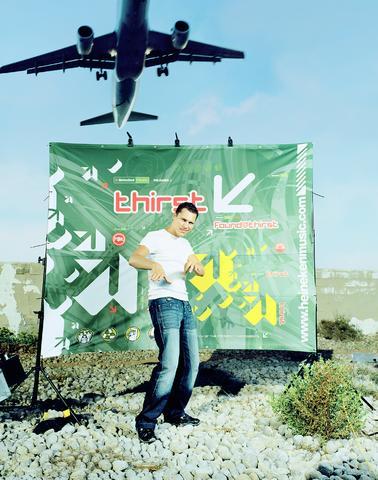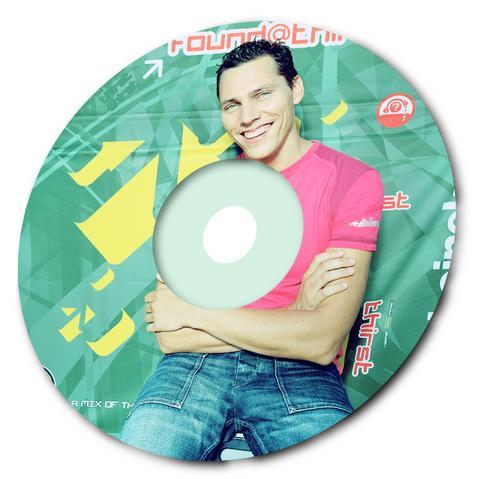When Tijs Verwest, a young man from Holland, decided he wanted to be a DJ he started practicing in his bedroom and dreamed of appearing at the odd party and on local radio, if he was lucky. It was the mid-1980s and playing records for a living wasn't cool or a well-paid job.
"When I was 15 I never expected to become a DJ like this. I mean, at that time no one was even looking at DJs, it's become a whole different game nowadays," Tiesto (aka Verwest) said in a telephone interview earlier in the week from Vietnam, where he was touring.

"At the end of 1996 it was more about the party than the DJ and now it's a lot more focused on the DJ. Now the DJ is a rock star. At that time playing records was just a hobby and no one took it seriously. If I said I was a DJ five nights a week people turned round and said, `Well, what's your day job?' There was not even a living to be made as a DJ."

Fast forward to the beginning of the millennium and the young man had carved a name out for himself as one of the finest live DJs on the planet. This was confirmed when he was voted the world's best turntablist by the influential DJ Magazine in 2002 and again last year. DJ-list and various other publications backed this judgment. He is earning megabucks from his records, his remixes and club dates and is currently sponsored by Heineken to tour the world as the global ambassador of dance music.
"I was, like, a bedroom DJ. At that time, I didn't come from a rich family and my parents were divorced, so what I've done is pretty much become a self-made man and gone on to discover myself. No one taught me how to learn or mix, but I do think that I've made something with my life, with music, because it just gives me so much joy. As a kid I wanted to achieve something, and I think I have."

What he makes are swirling landscapes of sound, his blend of light trance and up-beat house refining the beat of contemporary house music into an electronic symphony. He plays sets that last from three to six hours, that he describes as being musical journeys.
Trance is the most popular dance music genre and this is one of the main reasons why he is the world's most respected DJ. But in addition, he has broadened the appeal of a repetitive and sometimes one-dimensional trance beat by adding the warmer melodies of Ibiza and the breaks of garage and house. His mixing is seamless and at times innovative.
He has an intelligent approach to his set, that builds like a novel, with a definable start, middle and end, with breaks to make it interesting and dictate the mood. He said he tries to tell a story through the music.
"I try to take people on a musical journey through the different sounds there are. It's not just trance but other styles as well. I put it together so it's like a journey, the high points and the low points, a musical trip. That's what I try to achieve. And I always like to end on a high."
Tiesto said he differentiated himself from many other DJs, who have a more vinyl-centered approach to their shows and try to "educate" the crowd and break new records. "Basically," he said "I'm a crowd-pleaser. I watch to see what hits and what misses and I build it up from there."
"Some DJs like to play for themselves, not for the crowd. It's a whole different direction. John Digweed, for instance, has a totally different sound, a different connection with the crowd, he's very in-himself."
Tiesto's gig tomorrow night at Taipei's World Trade Center III is being handled by Alan Hsia of Loop productions, who said "no expense has been spared" to provide the technical specifications demanded by the DJ to produce a memorable show. "It will be one of the most spectacular events Taipei has ever witnessed," Hsia said.
There are no limits on the sound system, which maxes out at 124 decibels -- comparable to a clap of thunder from a nearby storm, a gunshot or fireworks. The lighting system is so intense it carries a health warning for those liable to epileptic seizures. The venue will be decked out for the night and "Orange Boy" -- the stilt walking, fire breathing dominatrix who rocked Kenting -- will be making an appearance, along with the full set of shaking Heineken girls, DJ contest winners, DJ Vertigo and Joe Ho, Daniele Davoli and Miss Motif.
Arrive early (8:30pm) to avoid the queues, Hsia said, adding Tiesto was scheduled to play for over three hours.
The Interview
Taipei Times: How does it feel to be the best DJ in the world?
Tiesto: It feels great. I'm very happy with it. [Being voted top DJ] made quite a lot of difference, people took me more seriously. I've had more offers to play in different countries, I get more remix requests, so it's great.
TT: Have you changed?
Tiesto: I'm not the same person I used to be. You just change, you just learn so much traveling around the world as a DJ and meeting so many different people. I think I've become more quiet. I've learned it's all about yourself, not your car and your money: that's not the thing that makes you happy, you have to be happy with yourself.
TT: There aren't many musical stars from Holland. How do you explain your success?
Tiesto: I think it's because this music is global and it doesn't matter where you're from. Before, if you were a singer from Holland, well, you weren't going to get anywhere. If you're a singer and you're Dutch no one's going to take you seriously. If you're a singer, you have to come from England or America, or it's harder to make a breakthrough. If you're from South America it's very difficult.
TT: What DJs would you like to play with?
Tiesto: I don't play that often with other DJs ... sometimes at the festivals. But really, I think all DJs are little islands. Every DJ has his own style, like if you put me together with Carl Cox, or John Digweed, well, it's like putting Britney Spears and Lenny Kravitz together. They have different styles, it's a whole different ballgame.
TT: Do you think spinning records is like playing an instrument?
Tiesto: [Turntables] are definitely instruments. Certainly, with the techniques that you use to play them, the technical skills can make a difference to the sound of the record. With all the effects and sampling and wah-wah and the other techniques nowadays, it's now much harder to entertain people with just records.
TT: What's the difference then, between say
playing a guitar and DJing?
Tiesto: With a guitar, say, it's easier. Look at the Rolling Stones. When they play, everyone knows what they're going to play and they play it. If they play all the songs the crowd wants then they please the crowd, but that's not really new is it? My audience also gets to hear the big tunes, but I have to constantly innovate, constantly bring in new tunes.
TT: So, is rock music dead?
Tiesto: Definitely not. Actually I'm more influenced by other rock artists. When I listen to Radiohead or even to Coldplay I get off on the release of the emotion, that's what I try to do with my music.
TT: Are you going to be doing the same in 10, 20, 30 years?
Tiesto: Musical changes are very slow in general. Dance music has been here for 10 years already, hip hop is still strong, in general there's so much that has already been done, not just in dance music but in rock music as well. Everything's been done and everyone is just repeating themselves. It's very difficult to see what will happen in the future. There should be more instruments from around the world that will be introduced to change the music. In 20, 30 years I definitely won't be doing the same, though I will be involved with music, maybe as a stage hand, or in the media ....
TT: How's the tour been?
Tiesto: Vietnam is a high point. I had a great time in South America, though. I played to a couple of hundred thousand people altogether. Argentina, especially, was amazing. They were sitting down when there were breaks [in the records]. They just sat down on the dance floor. And then, when the breaks finished and the beats came in, they just stood up and started screaming and dancing like crazy. It was amazing. Sitting down all across the dancefloor. At first I thought, `What's going on? Has there been a fight?' And they said, `no just carry on.'
TT: And in Asia?
Tiesto: There's a funny story actually. In Vietnam its very traditional, it's quite different and not very opened up. So I had to write down the names of all the tracks that I might be playing and I had to perform my set for the national government. I performed for the minister of culture, to see if there were any offending lyrics in the melodies that might offend them, or the Vietnamese people. This is a very strange cultural difference, where I have to be approved by the government to play for the crowd. The minister of censorship and some other high ambassadors, they decided that my music was good enough for their people, so that's nice.
TT: Could you tell us a little bit about your private life?
Tiesto: What I'm doing at the moment is just focusing on the dance floor. Yeah, the thing is my private life is my DJ life as well. It's all mixed up together. I'm always caught up in being Tiesto, so it's who I am and what I do. So what is it that I do? I DJ. So where do I travel? Well to clubs and studios. I produce music and do interviews and party every weekend. I am Tiesto and that's also my private life. My private life is on the street.
TT: You know the Dutch conquered Taiwan over 350 years ago?
Tiesto: Yeah, I don't remember that, it was a long time ago.
Just the facts:
Name: Tijs Verwest. Tiesto is the nickname he was given as a youngster, from his name Tijs.
Age: 31
Born: Breda, Holland
Started DJing: 15
Facts: Prefers beer to pop; doesn't do cigarettes or dope; hasn't made his mind up about George W. Bush; feels like a flying Dutchman, his worst job was pizza delivery and he likes Asian foods.
Quick quiz:
Are Dutch all the same? "Of course not."
Supermodels? "I love them."
Beaches? "Love them."
Peaches? "Love them as well."
Peaches on the beaches? "Together is best."
Best show? Too many.
Worst show? "The police stormed the party, the sound was too high."
Taipei? "Looking forward to that."
Amsterdam? "My favorite place on earth."
Disco-graphy:
1985 to 1993: Performed at clubs in Holland. Formed Black Hole Recordings with Arny Bink.
Released Magik (one/two/three/four/five/six/seven) and In Search of Sunrise (one/two/three) series.
Also mixed the first two Space Age volumes.
His remix of Delerium featuring Sarah McLachlan broke him internationally.
The Silence went top 10 in the UK.
2001: Started new label, Magik Muzik, released Flight 643 and In My Memory.
2002: Black Hole Recordings UK started. Won DJ Magazine DJ crown, a feat he repeated the next year. Another Day in the Office.
2003: Solo show for 25,000 at Gelredome in Amsterdam; Tiesto in Concert DVD goes gold. Traffic the first instrumental track to reach UK No. 1 in 23 years.
Just Be. Compilation album Nyana.
2004: World tour.
Has done remixes for Moby, Dave Matthews Band, Kosheen, Mark Norman and Mr Sam vs. Fred Baker, and many others.

On April 26, The Lancet published a letter from two doctors at Taichung-based China Medical University Hospital (CMUH) warning that “Taiwan’s Health Care System is on the Brink of Collapse.” The authors said that “Years of policy inaction and mismanagement of resources have led to the National Health Insurance system operating under unsustainable conditions.” The pushback was immediate. Errors in the paper were quickly identified and publicized, to discredit the authors (the hospital apologized). CNA reported that CMUH said the letter described Taiwan in 2021 as having 62 nurses per 10,000 people, when the correct number was 78 nurses per 10,000

As Donald Trump’s executive order in March led to the shuttering of Voice of America (VOA) — the global broadcaster whose roots date back to the fight against Nazi propaganda — he quickly attracted support from figures not used to aligning themselves with any US administration. Trump had ordered the US Agency for Global Media, the federal agency that funds VOA and other groups promoting independent journalism overseas, to be “eliminated to the maximum extent consistent with applicable law.” The decision suddenly halted programming in 49 languages to more than 425 million people. In Moscow, Margarita Simonyan, the hardline editor-in-chief of the

Six weeks before I embarked on a research mission in Kyoto, I was sitting alone at a bar counter in Melbourne. Next to me, a woman was bragging loudly to a friend: She, too, was heading to Kyoto, I quickly discerned. Except her trip was in four months. And she’d just pulled an all-nighter booking restaurant reservations. As I snooped on the conversation, I broke out in a sweat, panicking because I’d yet to secure a single table. Then I remembered: Eating well in Japan is absolutely not something to lose sleep over. It’s true that the best-known institutions book up faster

Though the total area of Penghu isn’t that large, exploring all of it — including its numerous outlying islands — could easily take a couple of weeks. The most remote township accessible by road from Magong City (馬公市) is Siyu (西嶼鄉), and this place alone deserves at least two days to fully appreciate. Whether it’s beaches, architecture, museums, snacks, sunrises or sunsets that attract you, Siyu has something for everyone. Though only 5km from Magong by sea, no ferry service currently exists and it must be reached by a long circuitous route around the main island of Penghu, with the